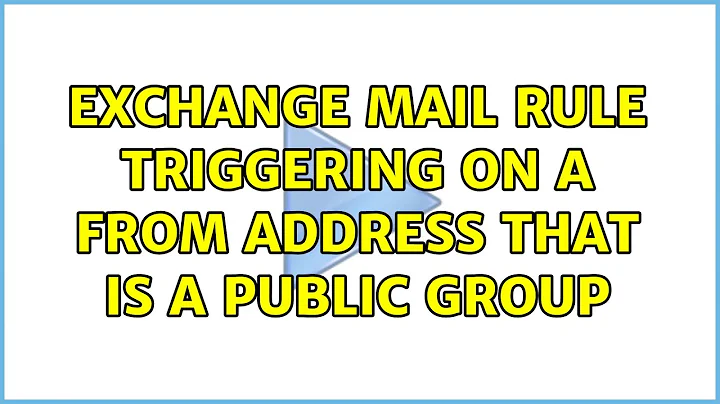Exchange mail rule triggering on a From address that is a public group
The problem you're running into is that a Group is basically an alias for a collection of email address and contact objects; not a standalone object, and not just a list of strings containing email addresses.
So when you reference group, you're actually referencing all member objects in it.
Similar to when you send to a group, it doesn't send it to the group's mail box (cause there's no such thing), instead, the server receives it and sends a copy to each recipient in the group.
So you're saying "Move all messages received from people in this group to X", yet you don't want it to move when you receive email from people in the group. Your 2 wishes directly conflict.
If you want to do a plain-text search and move based on what the group is named, instead of what it represents, then use the text-in-header rule you've suggested, and live with possible false positives.
Unfortunately one gotcha is that, unlike a regular "from" rule, this rule will be client-side only. Meaning it'll only work when your copy of Outlook (that has the rule) is being actively used.
Additionally, in Outlook 2013 (I believe that's the first version with it) they've added a new rule that's very similar to the message Headers rule, only it's "with specific words in the sender's address".
Either will work, but the second will help avoid the false positives you suggest (i.e.: it being filtered because the address is in the subject, etc.).
Related videos on Youtube
Gilles 'SO- stop being evil'
Updated on September 18, 2022Comments
-
 Gilles 'SO- stop being evil' over 1 year
Gilles 'SO- stop being evil' over 1 yearI have an email account on an Exchange server (the online version running on Microsoft's servers) which I access via Outlook. I want to set up an email rule to automatically move certain messages to a different folder as soon as they are received. I know how to do that, what I'm having trouble with is defining the condition for this rule.
The condition I want is: if the “From” address is
[email protected]. This address is what Outlook/Exchange considers to be a public group; if I ask for the properties of this address, Outlook tells me that it has members[email protected]and[email protected]. If I select “from people or public group” as a condition for the rule and enter[email protected], Outlook tells me:To filter messages you receive as a member of a public group, we recommend using a 'sent to' condition. A 'from' condition will apply the rule to all messages received from any member of the public group.
Do you want to remove public groups from this condition?
If I select “No”, then as warned the rule applies to mails from Alice and Bob. This is not what I want! Outlook's recommended alternative is not what I want either: I want to filter emails where
[email protected]is in the From header, not when it's in the To header.There's a condition “with specific words in the message header”, but it's no good because the name
mygroupcould appear in other headers like Subject and I don't want to filter these.How do I filter emails sent from a specific address, regardless of the fact that it's a public group?
-
 Gilles 'SO- stop being evil' about 9 years“with specific words in the sender's address” is working — fortunately we have a recent enough version of Exchange. Searching all the headers has too many false positives to be usable.
Gilles 'SO- stop being evil' about 9 years“with specific words in the sender's address” is working — fortunately we have a recent enough version of Exchange. Searching all the headers has too many false positives to be usable. -
ScarletPumpernickel over 6 yearsFor me, in some cases the group name in the rule appears in bold and other cases not. Where it is not in bold (i.e. looks like an individual email) the rule is not propagated to members of the group. Oddly enough, I can still right-click such a non-bold group address to see its members in the properties, i.e. it behaves like a group for all purposes except within the rule where it behaves like an individual email. I don't know what makes some groups appear in bold in the rule and others not although both are expandable to members in an email (outlook 2013).




